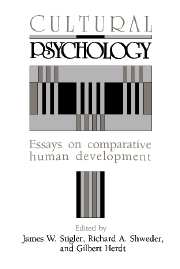Book contents
- Frontmatter
- Contents
- Preface
- Cultural psychology – what is it?
- Part I The keynote address
- 1 On the strange and the familiar in recent anthropological thought
- Part II Cultural cognition
- Part III Cultural learning
- Part IV Cultural selves
- Part V Cultural conceptions of psychoanalysis
- Part VI Cultural domination and dominions
- Part VII A skeptical reflection
- List of conference participants
- Name index
- Subject index
1 - On the strange and the familiar in recent anthropological thought
Published online by Cambridge University Press: 05 June 2012
- Frontmatter
- Contents
- Preface
- Cultural psychology – what is it?
- Part I The keynote address
- 1 On the strange and the familiar in recent anthropological thought
- Part II Cultural cognition
- Part III Cultural learning
- Part IV Cultural selves
- Part V Cultural conceptions of psychoanalysis
- Part VI Cultural domination and dominions
- Part VII A skeptical reflection
- List of conference participants
- Name index
- Subject index
Summary
It is a pleasure to join with you in commemorating the anniversary of the Committee on Human Development. While the other important ventures in interdisciplinary teaching and research – most notably Yale's Insititute of Human Relations and Harvard's Department of Social Relations – have long passed from the academic scene, the committee has not only survived, but it has grown. For that, Chicago should be proud, and the rest of us (those of us, at least, who deplore parochial specialization) should be grateful.
In commemorating this occasion, I had originally intended to discuss cultural internalization, an especially appropriate topic for a conference like this because it is both developmental in content and interdisciplinary in focus. Upon further reflection, however, it occurred to me that such a topic is too complex to address in this brief space. Therefore I have chosen instead to speak on the dialectical relationship between the strange and the familiar in the history of anthropological thought. Although the latter topic does not have a developmental focus, it is interdisciplinary inasmuch as the changing anthropological views on this matter have been informed by, and have in turn informed, recent developments in the other human sciences.
Because a scholarly essay does not, like Athena, spring full-grown from the brow of its genitor – even though its birth, like Athena's, may have been precipitated by a prolonged headache of the genitor – it is perhaps desirable to indicate the genesis of this essay.
- Type
- Chapter
- Information
- Cultural PsychologyEssays on Comparative Human Development, pp. 47 - 62Publisher: Cambridge University PressPrint publication year: 1990
- 21
- Cited by



